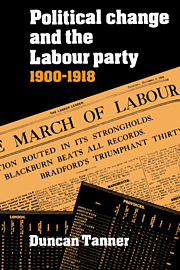Summary
The political changes of 1900–18 had three components. First, Labour changed its electoral strategy from a policy of limited parliamentary campaigns and alliance with the Liberals before 1914, to a policy of massive parliamentary campaigns and opposition to all parties beginning at the 1918 election. Secondly, Labour's electoral performance improved. It fared worse than the Liberal party before the war, but progressively outdistanced it thereafter. Thirdly, both parties appeared to change in the process. They developed features which would help determine their strengths, weaknesses and characteristics as parties of the centre-left.
These important changes have attracted a great deal of scholarly attention. Why, historians have asked, was the Liberal party replaced by Labour after the First World War, when before 1910 it was unquestionably the major working-class party? The conflicting answers revolved around the rise of class-based politics. In the 1950s and 1960s Marxist and Weberian sociologists and political scientists argued that class was the crucial determinant of electoral behaviour, all else being ‘embellishment and detail’. For Marx, changes in the nature of capitalism would inevitably throw up working-class organisations; Weber too had accepted the connection. The nature of the British political alignment, the fact of Labour's success and the Liberal party's failure, seemed to confirm Labour as the working-class party. As class replaced religion as the basis of political alignments, support for Labour would (and did) increase, whilst for the Liberals it would (and did) decline. Labour's rise was inexorable and inevitable.
- Type
- Chapter
- Information
- Political Change and the Labour Party 1900–1918 , pp. 1 - 16Publisher: Cambridge University PressPrint publication year: 1990
- 2
- Cited by



